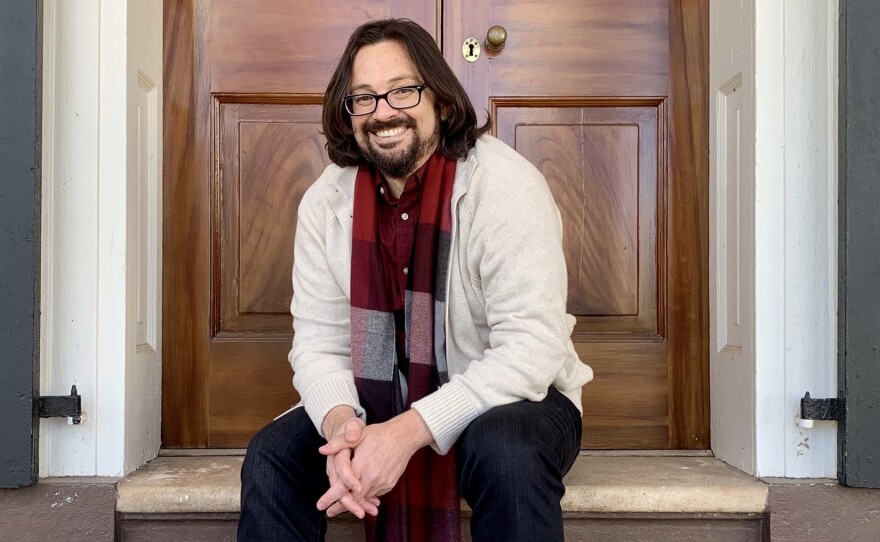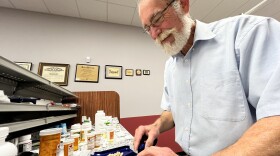To mark Pride Month, VPM News is taking a look at the history of gender and sexuality in Native American culture. Gregory Smithers, a history professor at Virginia Commonwealth University, is the author of the book “ Reclaiming Two-Spirits: Sexuality, Spiritual Renewal and Sovereignty in Native America.” Smithers spoke with VPM News’ Alex Scribner about his recent work and the role of two-spirit people within Indigenous communities.
The following has been edited for length and clarity.
VPM News: What does the term two-spirit mean and what role do two-spirit people have within Indigenous communities?
Gregory Smithers: The term "two spirit" refers to people with both male and female spirits within a single person. Historically, two-spirit people are among the most important members of Native American communities — among the most important, but also among the least studied and understood in Native American history and culture.
Two-spirit people were entrusted with very important cultural and historical knowledge within their respective communities. So, in that sense, it's not, strictly speaking, a term that refers to one's sexuality. However, it can. You can be gay, but not necessarily two-spirit. You can be two-spirit, but not necessarily gay. There’s fluidity, and a spectrum of roles and identities that people have historically had within native communities.
It's a fairly recent term. In the late 1980s, gay, lesbian and bisexual Indians were debating the issue of language — what to call themselves and how to gain visibility within gay and lesbian politics at the time. You gottta remember, at this time, HIV/AIDS is a pandemic that is wreaking havoc through communities around the world.
So, you can be gay, but not necessarily two-spirit. You can be two-spirit, but not necessarily gay. There’s fluidity, and a spectrum of roles and identities that people have historically had within native communities. Sexuality can be an important part of it, and healthy sexuality along the spectrum of sexual expression is definitely something that two-spirit people talk about today.
Historically speaking, the connection between sexuality and gender roles is only something that really begins to become much more closely wedded in native communities during the 19th century.
Being "keepers of knowledge," how have two-spirit people contributed to reclaiming Indigenous history? And what about reclaiming their land?
It's in doing the roles that are historically associated with two-spirit people. So, caregivers, the knowledge keepers, the ceremonial leaders — people who tend to and prepare people for the afterlife. A whole slew of roles. As two-spirit people were telling me when I was interviewing them for the book, people just continued to do that. And there was this sort of quiet recognition that they were performing roles traditionally associated with two-spirit people.
Your book starts with the earliest Spanish invasions of North America, noting attempts by colonial authors to erase two-spirit people from written history.
There are a lot of euphemisms that exists in colonial archives. So, you're gonna see terms like "sodomites," "hermaphrodites." And there's a slew of others that are used by European authors to describe people that they perceive as what today we would understand as homosexual or men who are dressed in — quote — women's attire. I'm putting these terms in quotation marks, because they're contested and they're constructed culturally. But women who wear men's clothes and take on men's roles, this really confused Europeans. Europeans didn't come from a culture where this was necessarily acceptable. And it was becoming less and less acceptable at the time they were engaging in their invasions.
It's not clear to me from the sources that Europeans really understood what they were seeing and hearing generally within native communities. And so, I think we have to be very critical in the way that we approach the ethnographic descriptions that Europeans left in their journals, in their official correspondence and other documents that we use to recreate history.
You quoted an elder, who said, “It’s exhausting having to constantly educate white people.” With that in mind, how do two-spirit people you spoke with view themselves within queer communities?
Prejudice was layered throughout gay and lesbian communities as much as it was layered throughout the broader American society. It's exhausting for people, because there's this constant need to justify and rationalize their existence, to explain themselves in a way that a white gay, male or lesbian does not necessarily have to do anymore.
It can be exhausting, but the thing about it is, is that — and this is what two-spirit elders told me in researching the book — they're really encouraged by the next generation of activists and social workers and academics and writers. And just by people who are creative across a whole spectrum of skill sets.












